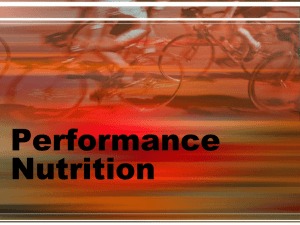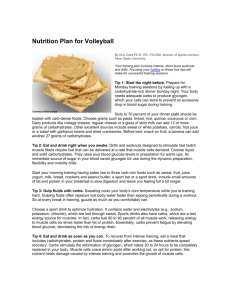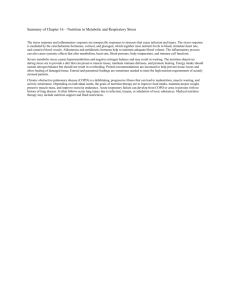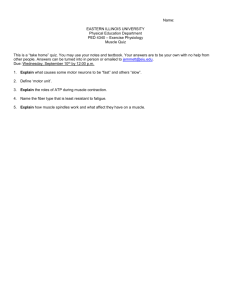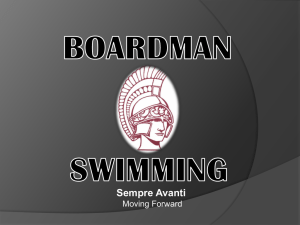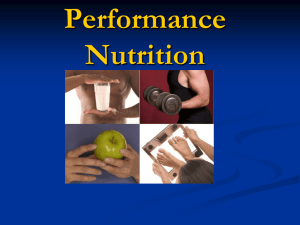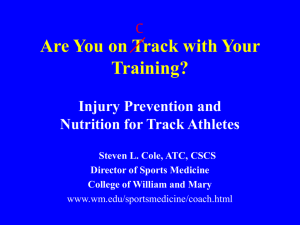Sports Nutrition
advertisement
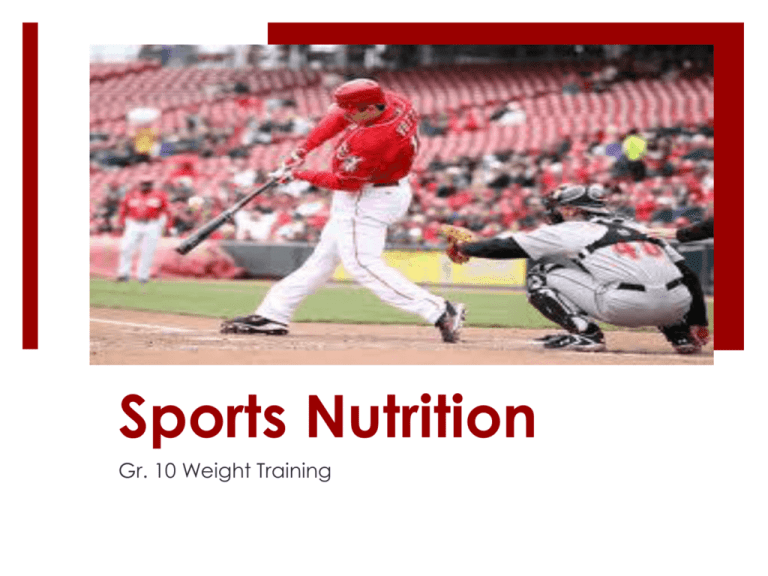
Sports Nutrition Gr. 10 Weight Training Brief History of Sports Nutrition Documentation of “special” foods and nutrition strategies dating WAY back…. Greek Olympians in 300BC used specific mushrooms to enhance performance In 1800’s Dutch swimmers used caffeine before races, Belgian swimmers dipped sugar cubes in ether before racing. Brief History of Sports Nutrition Alcohol was commonly drunk to increase performance in the Olympics through the early 1900s. Evolution of Gatorade in 1960’s by 4 physicians at the University of Florida to help the football team. Initially met with skepticism that taking in sugar and salt could be beneficial… it caught on fast! 80’s and 90’s - Well-known athletes started crediting nutrition with their success. What Influences Athletic Ability? Your Mom and Dad! – Genetics Optimal Training Perfect Practice (practice does not make perfect!) Good Coaching as well Your BIRTHDAY?! Good Nutrition No “secret” ingredient What does ‘Performance Nutrition’ mean? Fueling to boost activity performance on a daily basis Fueling to decrease the risk of injuries, recover fully after workouts and stay healthy Fueling with foods that taste good, foods you enjoy, foods that can be prepared easily, and foods you feel confident eating Consequences of Poor Nutrition Weight loss Strength loss Lethargy Chronic Fatigue Soreness, joint pain Micronutrient Deficit Respiratory Infections Diminished Performance Calorie Needs for Athletes You need to make sure you are always fueled! Keep the balance… Calories Consumed Calories Expended Rule of thumb: Walk or Run 1 mile = 100 calories burned Energy Needs: From Couch Potato to Elite Athlete Calories/# 120# 160# 240# LOW - sedentary 1560- 1800 2080-2400 3120-3600 ACTIVE (30-60min) 1920-2160 2560-2880 3840-4320 MODERATE (1-1.5hr) 2280-2520 3040-3360 4560-5040 HIGH (1.5-2hr) 2640-2880 3520-3840 5280-5760 VERY HIGH (2-3hr) 3000-3600 4000-4800 6000-7200 McDonalds Triple Thick Choc. Milkshake = 1250 cals Carbohydrates Muscle FUEL Carbs reach muscles quickly They are used to create GLYCOGEN (The Primary energy source) 2 main types: SIMPLE and COMPLEX carbs Try to stick to complex! (Breads, pasta, fruits and veggies, grains + oats) Don’t eat simple carbs too often! (Candy, sugar) Carbs = Fuel Carbohydrate Needs: 30 minutes moderate exercise: 1.8-2.7g/# 1 hour intense training/day: 3g/# 1-2 hours intense training/day: 3.5-4g/# 2-4 hours intense training/day: 4-4.5g/# Ultra endurance athlete: 5.5g/# 165 Pound Soccer Player: 675 gm/day What about you?? Protein Role in Exercise? Muscle growth and repair Supplies 10% of fuel when glycogen stores are low Aids in repair/recovery following muscle damage after an activity or a workout Found in chicken, fish, eggs, meat, beans, milk/cheese/yogurt Protein: Muscle Building and Repair Protein Needs/DAY: 0.6-0.8 g/# (For athletes/people who work out!) Protein intake and timing of protein intake 175 lb are both important for increasing lean muscle mass Male = 140g/day Eating protein several times a day may enhance availability of amino acids during workout Going into strength workouts well nourished is critical! This ensures strength gains and decreases protein losses Refueling immediately after workouts with a carbohydrate/protein mix is essential for strength gains Which is the BEST Protein Supplement? For the last 3 years, MYOTEIN has been voted the #1 protein powder available based on effectiveness, speed of results, safety and $ value, BUT…. Do we need to take this stuff??? The answer is, IT DEPENDS Protein supplements are good IF you cannot digest the necessary protein 30mins after your workout! THIS IS WHEN REPLENISHING YOUR PROTEIN LOSSES IS MOST CRITICAL. 30MINS IS YOUR WINDOW If you are able to eat a meal rich in protein + carbs in this window, you don’t need to buy this stuff!!! Hydration Components of Muscle 20% Protein 5% other 75% Water Why do we Need to Hydrate? Performance!! At 2% dehydration your ability to perform can drop 15%!!! (Mental focus, reaction time) Thermoregulation Cardiovascular function Injury prevention Recovery Sweat loss during 2 hours of exercise can be 2 liters or more!! Hydration – Need to Knows DRINK BEFORE YOU’RE THIRSTY. When you’re thirsty, its too late! You’re already at 1% dehydration (3 cups of sweat for a 150 pound person) We need at least 10 glasses of water a day. 20 glasses if we’re training!!! – Invest in a reusable container! Fruit juices, esp. O.J and peach juice are the best ways to replenish electrolytes lost via sweating. Mix them 25% juice + 75% water though! Impaired Performance! Muscle strength Speed Stamina Energy Cognitive Process Risk of Injury 95% of muscle cramps are due to dehydration! When Should You Drink? WHEN TO DRINK AMOUNT OF FLUID 2 hr before exercise 2-3+ cups 15 minutes before 1-2+ cups Every 15 minutes DURING 1-1.5 cups After Activity 2-3 cups What about Sport Drinks?? Is Gatorade necessary for hydration during an activity?? IT DEPENDS! If it is under an hour, water is the way to go (Unless it is REALLY intense!), but any activity/sport over an hour, sport drinks can be beneficial and act to drive thirst/replenish lost electrolytes Gatorade and Powerade are basically sugar and sodium – they should not be consumed if not doing an actual activity!! (Don’t drink them casually at lunch) Pre-Exercise Fuel Pre-exercise fuel should: Provide energy to working muscles Maximize blood sugar and glycogen stores Provide a psychological edge Minimize hunger during play Maximize hydration Be individualized Pre-Exercise Fuel – cont. Meals should be 2/3 normal size Meals: 3-4 hours before competition/activity Snack: 1 hour before competition/activity A little protein powder mixed into some fruit juice 20-30 mins before a workout is an excellent idea! If you don’t have these, a peanut butter and banana sandwich is perfect Snack should be a mix of carbs and protein (3g of carbs for every 1g of protein) Timing of Protein & Carbohydrates To enhance protein synthesis in muscle and replace glycogen stores… NEVER exercise in fasted state Eat immediately after exercise [in your window of opportunity] Recovery Defined: Helping athletes bounce back for future exercise bouts Considerations Intensity of exercise When will athlete exercise again? Nutrition Recovery Goals: Glycogen restoration Fluid & electrolyte replacement Muscle repair and adaptation Refueling after Exercise VERY Important for Athletes For those in multiple events in one day For those training daily “Window” for Refueling First 30 minutes after exercise is critical Glycogen repletion occurs faster after exercise Increased blood flow to the muscle Enzymes that produce glycogen are most active Anabolic Steroids Creatine Caffeine
